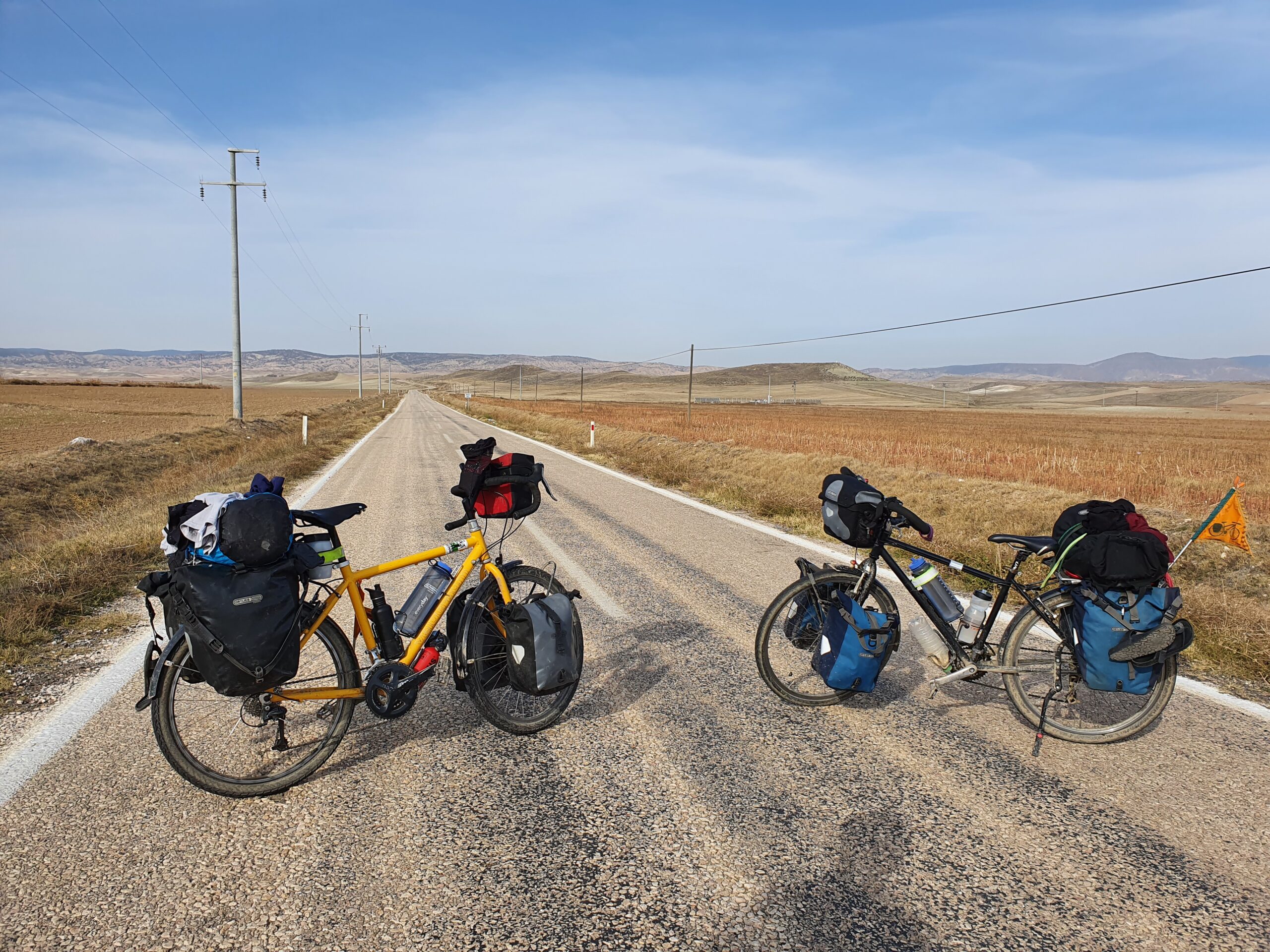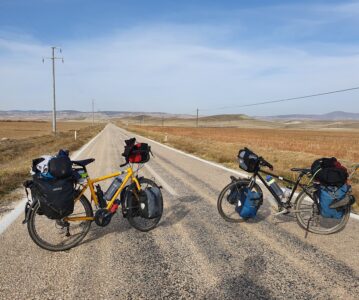The next two days we drive through a plain full of fruit plantations and meet proud farmers who each give us at least a few apples to take with us on our way.
The sky is blue, the leaves are golden and we look forward to the mountains to come.
We seem to be crossing the fruit basket of Turkey. Both sides of the road are lined with quince, apricot, apple, pear and olive trees. In between are planted chilies, hot peppers and eggplants and during some kilometers kiwi fruit plantations surprise us. The town of Iznik, located on the eastern shore of the lake of the same name, cannot be passed quickly. The town is dripping with history and before we know it, we are invited to Çay by a friendly gentleman and presented with a bag of delicious olives. A local policeman/bike enthusiast leads us through the river/historical museum and we read through the not-quite-chronological info boards. Iznik is an ancient city and has been occupied over the centuries by pretty much all the major powers of the day. Iznik, or Nikaia, was once Roman, later the capital of the Rum Seljuks, then provisional capital of the Byzantines to become Ottoman and finally Turkish. The pretty tiles decorate many mosques in the country and we still often see the floral blue and white patterns.
From Iznik we continue inland. After driving through the fruit plantations, the road now winds up various valleys and the main business here seems to be chicken fattening. The autumn weather stays with us and the landscape changes every day in the most wondrous way. We drive through coniferous forests, past rugged cliffs and fertile valleys and small, friendly farming villages. At this altitude it is getting quite fresh in the evening and so we sometimes ask the locals for a sheltered place for the tent. This request gives us again and again great contacts with the locals. In Sukuz we are allowed to spend the night in an empty room above the unused tea room, the imam brings us a piece of cake for dessert and the next morning we spend some time in the local mosque and chat with him using the translation apps. Saleh hopes we get a positive image of Islam, explains the peculiarities of a mosque, and Louie even gets to climb up into the minaret for a unique view over the autumnal valley. People like Saleh touch us deeply. Their attitude and actions are grounded in their faith and seem genuine, serene and selfless. The Islamic hospitality is unbelievable and we often feel really welcome, even if we show up for people out of nowhere, so to speak.
After Sukuz, the landscape really changes. Towards evening, we drive down out of the mountains into an incredible expanse. The earth and hills glow an earthy red and the stratification on the slopes give the hills an impressive striped look. We fly and marvel and find a beautiful place to spend the night. A low shelter in the middle of the rust red expanse; surrounded by rainbow hills and silence. What a privilege, what happiness, what an incredible environment!
In the morning, a shepherd drives his flock close to our camp. The huge, beige guard dogs examine us attentively, sniff us carefully and then move on with the herd. The dogs here, although really big, are mostly extremely friendly and we have to fight much less with unpleasant encounters than still in Greece. Every now and then a big, half-wild dog lies down in front of our tent during the night and apparently guards us.
We are not really moving fast at the moment. The route is just too beautiful and the encounters too precious to just speed through. In the small village of Hamamkarahisar we are invited by three friendly, older men to attend the noon prayer in the mosque. We sit in the back of the room while the three friends; all over 70 years old go through their prayer routine together with the young imam who enters the prayer room at the last minute. One of them has a knee problem and is doing the curtsy as well as he can, another one has a nip and tuck, and every now and then there is a little fart to be heard – wonderfully human and uncomplicated. We decline the subsequent invitation to lunch and the gentlemen encourage us to visit the local hamam. A hamam? Finally we go there and enjoy the hot thermal water in separate baths and soon after the nice feeling of long forgotten cleanliness.
This day is far from being finished. When we fill up our water bottles in the evening in a small town, we are invited by two young women to spend the night. We find ourselves in a small courtyard, are led into the heated anteroom, provided with tea and cookies and introduced to the extended family. The parents seem to agree to our visit without being asked and we sit there not seeming to mind. The father is going to Ankara the next day for an operation and presumably that is why some of the children, who are already married, are visiting along with their dependents. After dinner in the main room, I count 11 adults and two grandchildren. Fatma Nur and Bilge are the youngest of the eight children. Bilge works in the family bakery, Fatma Nur is still in school and wants to become a writer later. We are allowed to spend the night in the brother’s currently empty room. The two of them prepare a bed for us made of soft blankets and pillows. Before we are left alone, there is time for interesting questions about Islam, faith and women in Islam. Bilgen and Fatma Nur see themselves as open-minded women who remain deeply rooted in their faith and Kurdish culture. Their veiling is self-determined, as is their choice of partner, and they have clear ideas about the roles of women and men in the household. “In life, it is normal for women to do the housework. Religion commands us to help, share and love.” Their views are certainly somewhat different from ours, but there is not much of the stereotype of the oppressed Muslim woman. The West’s prejudices against Islam are on their minds, and they too affirm that Islam “loves peace, not war.”
When I ask her what she thinks about the position of women in Islam, Fatma Nur types the following answer into my phone: “In Islam, we believe that heaven is under the feet of mothers. Men and women are not equal, the duties of women and men in life are different. I and my Muslim brothers and sisters believe that as Muslim women we have equal rights and women are highly valued.”
We’re pretty sure Fatma Nur is skipping school to provide us with a breakfast fit for a king the next morning. Before we leave, we are even presented with gifts, but we really can’t accept them due to lack of space. We agree to take a photo with the gifts and are then allowed to return them.
Translated with www.DeepL.com/Translator (free version)


